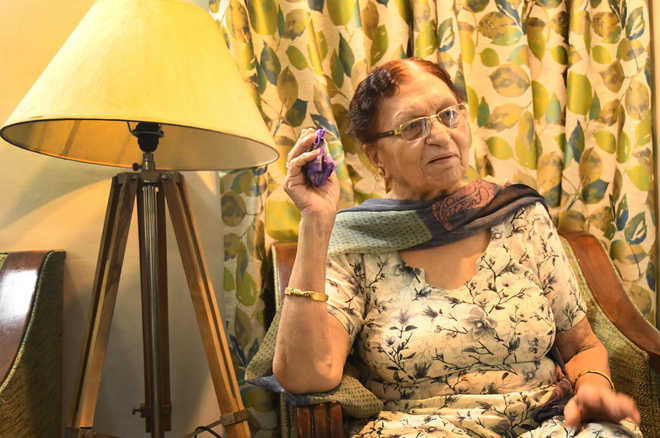Amarjot Kaur
Tribune News Service
Chandigarh, July 29
A cavalcade of memories traverses through the newly furbished living room of House No. C-76 at Panjab University, which was once home to prominent Hindi poet Kumar Vikal and a favourite haunt of the who’s who in the country’s literary circles. For 77-year-old Sudarshan, Vikal’s widow, who has been battling leukaemia for two years now, these memories are a cathartic escape to the time when poetry mirrored the realities of a third world nation and wielded a thought that provoked a social change. These memories are reminiscent of Vikal’s goodwill that gave her a roof over her head and a yearly pension from Punjab’s ‘Bhasha Vibhag’.
Every now and then, Sudarshan entertains chance visits from PhD scholars looking to find a new perspective on Vikal’s poetry and basks in the glory of the literary legacy her husband left behind. At first, she mistakes The Tribune correspondent for a PhD scholar and then says, “When Vikal was alive, so many journalists, critics, writers and poets frequented here, including famous critic Namwar Singh, writers Ravinder Kalia, Shailendra Shail and Upendranath Ashk and poet Alok Dhanwa. Ever since he died in 1997, not many people visited us.”
Vikal, who worked as a proof reader at Panjab University’s Publication Bureau, bagged the coveted ‘sarkari’ job at a ‘kavi sammelan’ in Chandigarh in 1962. He catapulted to popularity, becoming the region’s top Hindi poet and wrote three anthologies— ‘Ek Choti Si Ladai’, ‘Rang Khatre Mai Hain’ and ‘Nirupma Dutt Mai Bahut Udas Hoon’. “When he died, Panjab University had decided to send us back to the old house allotted to us in B-Block, a residential colony for clerks. However, the entire Syndicate intervened and decided that I would be in possession of C-76. His job title was passed on to my daughter-in-law,” recalls Sudarshan. “When we came to this city, we lived in a rented accommodation and were allocated House No. B-207 where we lived for 16 years. In 1988, Vikal was allotted C-76,” she adds.
With cancer taking a toll on her health, the only financial respite for Sudarshan is an annual sum of Rs 30,000 she gets as pension from Punjab’s Bhasha Vibhag. “Earlier, they gave me Rs 5,000, then Rs 10,000; this year, I got Rs 30,000. My son’s a good boy and supports me, but I don’t like asking for money. This is all that Vikal left behind — his goodwill and heart-wrenching poems. You know, he wrote about our maid too. Her name was Jageero. His loyalties were always with the poor, the needy. He was a kind man,” she says.
However, Sudarshan’s still ticked off with Vikal’s alcoholism. “I shall take this grouse with me to my grave. People would come to get poems and write-ups edited from him and would bring a bottle of wine or whisky along. His addiction went from bad to worse in the late 80s. He just couldn’t write without his daily fix,” she sobs.
On a nearby wall, a framed photo of Vikal in front of a blue-sky backdrop sits besides the table where he once kept all his favourite books and read for hours.
A friend indeed
The then Syndicate member, Deepak Manmohan Singh, shares on a phone call: “The matter regarding Vikal’s house was sent to the Syndicate. I mean, he was a national poet and a towering figure when it comes to Hindi literature. Secular and humanitarian, the contents of his poetry helped in building communal harmony during the period when the Punjab region was facing Hindu-Sikh communal tension during 1980-1990. The least Panjab University could have done for him was giving the possession of his house to his wife and not shift his family back to the B-Block. Vikal’s reflected the problems of oppressed and marginalised sections of society.”
Singh was also on the advisory board of the Bhasha Vibhag and made arrangements for Sudarshan to receive an annual pension from the department.
Unlock Exclusive Insights with The Tribune Premium
Take your experience further with Premium access.
Thought-provoking Opinions, Expert Analysis, In-depth Insights and other Member Only Benefits
Already a Member? Sign In Now










